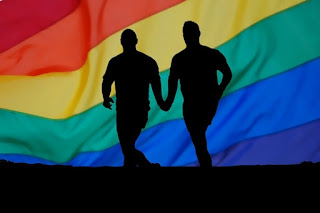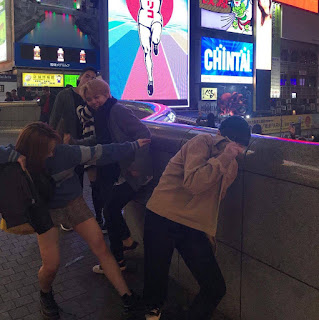Us, and them
Every society is divided into groups, and this division is so diverse that even 'us' cannot identify all the groups that we are included in. Social issues, gender economic situation, and many other things could be standards for dividing these groups. Among these standards, I would like to identify myself as a person who is 'open' to gender issues in this essay. People who are open to gender issues are relatively less than people who are closed to gender issues (I will now call each group 'open people' and 'closed people') that whenever we see someone who is open, we are extremely thrilled to talk with that person. Open people are the ones who can sympathize with the people who have been suffering especially in terms of gender matters, so they go through a hard time tolerating the talk with closed people whenever gender-related topics come out during their conversation. The oppression that some of the minorities came through over all these years is what binds us together, and when we do not have each other, we are not able to fully express our feelings and opinions freely.
On the other hand, closed people are the ones who don't even try to stand in the position of minorities, and try to keep their priority in the society. People may vary in terms of what issues they have closed minds about, but all of them share a binding factor in the fact that they cannot sympathize with minorities. When I ate dinner with teachers in my school as a student council member I asked the vice-principal of my school about his opinions for girls wearing the pants uniform. Then, the instant reply was, "I'm not used to that kind of idea. I cannot picture it." Now, at this point do you see the difference between us? While girls are falling down while walking in the hallway because of their long skirts, while girls are sleeping in an uncomfortable posture because of their tight top, the 'male' vice-principal of our school simply rejects the idea of change in girls' uniform because he is not used to that kind of idea. Would he really say that without a single moment of hesitation if he stood in the girls' position at least once? This is why open people cannot tolerate the conversation with the closed people whenever gender-related issues are brought up since the close people tend to talk as if they can tell us what we should do without thinking about our circumstances at least once.
But we cannot just criticize the closed people. Since the Chosun dynasty and for hundreds of years, Korea was full of people and ideas influenced by conservative Confucianism. They have lived with stereotypes for their whole life, and it is a very difficult thing to change your perspective towards the world since you have lived your whole life with it. With those kinds of stereotypes, it is plausible that you don't feel any need to stand in the position of people relatively weaker than you, for example, women or sexual minorities. Especially, stereotypes and discrimination towards women are so deeply placed in our unconsciousness, that most of the people who have lived over 30 years without even hearing the word 'feminism', cannot identify any problems in our society, where misogyny is prevailing. It may seem like an absurd requirement for closed people to just ask them to stand in women or sexual minorities' position and think about their plans because they have never thought that women and sexual minorities were being treated unequally.
I believe that difference originates from experience. If you have never experienced discriminations or difficulties when faced to gender issues, it is natural that you are not so sensitive to the rights of the people who are mistreated. But the bigger difference comes from 'attempts'. If you at least try to stand in the position of minorities, you will be able to understand why they are so crying out for their rights, and you will realize that something has been wrong throughout this long history of human. Also, for the open people who always talk so badly about the closed people, they will be able to understand why they are so closed. The matter is 'thinking in each other's position'. I believe that these groups can see each other eye-to-eye when they begin to try to understand each other, not just think that their counterpart is wrong from the beginning.
On the other hand, closed people are the ones who don't even try to stand in the position of minorities, and try to keep their priority in the society. People may vary in terms of what issues they have closed minds about, but all of them share a binding factor in the fact that they cannot sympathize with minorities. When I ate dinner with teachers in my school as a student council member I asked the vice-principal of my school about his opinions for girls wearing the pants uniform. Then, the instant reply was, "I'm not used to that kind of idea. I cannot picture it." Now, at this point do you see the difference between us? While girls are falling down while walking in the hallway because of their long skirts, while girls are sleeping in an uncomfortable posture because of their tight top, the 'male' vice-principal of our school simply rejects the idea of change in girls' uniform because he is not used to that kind of idea. Would he really say that without a single moment of hesitation if he stood in the girls' position at least once? This is why open people cannot tolerate the conversation with the closed people whenever gender-related issues are brought up since the close people tend to talk as if they can tell us what we should do without thinking about our circumstances at least once.
But we cannot just criticize the closed people. Since the Chosun dynasty and for hundreds of years, Korea was full of people and ideas influenced by conservative Confucianism. They have lived with stereotypes for their whole life, and it is a very difficult thing to change your perspective towards the world since you have lived your whole life with it. With those kinds of stereotypes, it is plausible that you don't feel any need to stand in the position of people relatively weaker than you, for example, women or sexual minorities. Especially, stereotypes and discrimination towards women are so deeply placed in our unconsciousness, that most of the people who have lived over 30 years without even hearing the word 'feminism', cannot identify any problems in our society, where misogyny is prevailing. It may seem like an absurd requirement for closed people to just ask them to stand in women or sexual minorities' position and think about their plans because they have never thought that women and sexual minorities were being treated unequally.
I believe that difference originates from experience. If you have never experienced discriminations or difficulties when faced to gender issues, it is natural that you are not so sensitive to the rights of the people who are mistreated. But the bigger difference comes from 'attempts'. If you at least try to stand in the position of minorities, you will be able to understand why they are so crying out for their rights, and you will realize that something has been wrong throughout this long history of human. Also, for the open people who always talk so badly about the closed people, they will be able to understand why they are so closed. The matter is 'thinking in each other's position'. I believe that these groups can see each other eye-to-eye when they begin to try to understand each other, not just think that their counterpart is wrong from the beginning.


Excellent. Much improved from the paper version it seems. I like the balance and generosity of your opinion, which seems especially essential in a setting such as Korea, where change has been both rapid and glacial at the same time. It seems the "generation gaps" in Korea are among the world's greatest, but at the same time there is a big part of the population who are staunchly keeping their views limited and closed. I hope you get the opportunity to keep writing in this field when you go to college (of course with more research and detail) , as you are clearly invested and determined to understand.
답글삭제